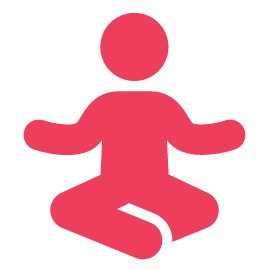About Mental Health
3 Ways to Cope With Stress and Anxiety
Anxiety is one of the most common mental health issues people face. Generalized Anxiety Disorder (GAD) affects 6.8 million people in the U.S. each year. We are also experiencing record-high levels of stress in the past few years, brought on by the Covid pandemic, economic worries, and global instability and unrest.
And far too few individuals receive treatment for anxiety and stress. Only 43% of those with GAD are receiving care for their anxiety.
We can’t eliminate stress and anxiety from our lives. But there are things we can do to help us cope with our anxieties in healthier ways.


Take Time for Yourself
Taking care of yourself and making sure you’re meeting your emotional, physical, social and psychological needs can go a long way toward helping reduce anxiety and stress. That can look different for different people, but the important thing is that you pay attention to your body and your needs and take steps to ensure those needs are met. Some things you can do include:
-
Take care of your body. Get enough rest. Schedule check-ups and regular doctor visits. Eat healthy foods that nourish your body.
-
Make time to unwind. Enjoy your favorite hobby, read, or engage in a relaxing outdoor activity and soak up vitamin D. Take frequent breaks to unplug and recharge.
-
Be social. Reach out to friends and family, volunteer with an organization you support, or connect with your faith-based community.
Exercise has been shown over and over again to positively impact our mental health and reduce stress and anxiety. 30% of individuals who exercise regularly reported feeling less stressed after exercising.
To get the mental health benefits of exercise, you should aim for at least 2½ hours of moderate-intensity physical activity (e.g. brisk walking) each week, 1¼ hours of vigorous-intensity activity (such as jogging or swimming laps), or a combination of the two.
Here are some things you can do to use exercise to reduce stress:
-
Set small daily goals. Aim for regular, daily consistency with your exercise routine rather than perfect or intense workouts.
-
Find forms of exercise that you find fun or enjoyable. For some, that may be running or swimming, while for others it could be playing in a sports league or kickboxing. Exercising by doing an activity you enjoy gives double the mental health benefits—the benefits of the physical activity itself and the benefits of doing an activity you enjoy.
-
Make it more enjoyable by listening to music, a podcast or an audiobook or by exercising with a buddy.

Know When to Seek Help
People with anxiety often feel like there’s nothing they can do to treat GAD or anxiety-related conditions. But anxiety disorders are treatable, and the vast majority of people with an anxiety disorder can be helped with professional care. Several standard approaches have proved effective, including therapy, medication and lifestyle changes.
If you or someone you know is struggling with anxiety and stress, reach out. Get help. You are not alone.



